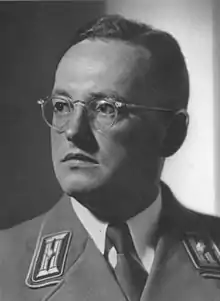
Dr. Walter Gross (written Groß in German) (21 October 1904 in Kassel – 25 April 1945 in Berlin) was a German physician appointed to create the Office for Enlightenment on Population Policy and Racial Welfare (Aufklärungsamt für Bevölkerungspolitik und Rassenpflege) for the Nazi Party. He headed this office, renamed the Office of Racial Policy (Rassenpolitisches Amt) in 1934, until his suicide at the close of World War II.[1]
Career
Walter Gross was born in Kassel. In 1925, while training as a physician, he became a member of the NSDAP. He was appointed leader of the National Socialist German Doctors' Alliance in 1932.[2] Gross was an anti-Semite and called for the extermination of the Jews and believed in the Final Solution that was so central to the Nazi Party. He wrote several books on the subject of the "Jewish Question". In many respects, he implemented the views of Alfred Rosenberg.[3]
In 1933, Gross was appointed to create the National Socialist Office for Enlightenment on Population Policy and Racial Welfare, which was designed to educate the public and build support for the Nazi sterilization program and other "ethnic improvement" schemes through the 1930s.[4] This was termed "enlightenment" rather than "propaganda" by Nazi authorities, because it was not a call for immediate action but a long-term change in attitude, aiming at undermining the view where people thought of themselves as individuals rather than single links in the great chain of life.[5] In its first year, it published fourteen pamphlets for racial education.[6] In 1933, he founded a mass-market glossy magazine, Neues Volk, which achieved wide popularity.[7] At the beginning of the war, his pamphlet You and Your Volk urged the soldiers to think racially.[8]
Gross burned his files in Berlin at the closing of World War II, thereby, in the opinion of Claudia Koonz, erasing significant evidence "that would have incriminated the more than 3,000 members of his national network of racial educators."[9]
Gross died in combat operations against the Red Army, which had already penetrated the Berlin city area, on 25 April 1945, in his private residence in Berlin-Schlachtensee. His colleagues would later describe this action as him 'seeking death', essentially committing suicide.
Writings
In 1938 Gross, then head of the Reich Bureau for Enlightenment on Population Policy and Racial Welfare, contributed a chapter entitled "National Socialist Racial Thought" to an English language book, Germany Speaks,[10] prefaced by Joachim von Ribbentrop, Hitler's newly appointed Foreign Minister. The book endeavored to put an acceptable face on the activities of Nazi Germany. Gross justified the sterilization program by arguing that "unrestrained propagation among the hereditarily unfit, the mentally deficient, imbeciles and hereditary criminals, etc.," had led to a birth rate nine times greater than that of the "fitter inhabitants".[11] He claimed that the Sterilization Law was passed "to prevent the transmission of hereditary disease".[12] He described how an application lodged with the Court of Heredity would lead to an inquiry and judgment as to whether sterilization was required.[13] He justified this as follows:
Civilization is only possible through the individual becoming part of the whole and just as collective authority in the interests of all limits the egoism of the individual [...] it similarly has the right to implement such measures for the benefit of the community as are scientifically proved expedient in the way of population policy or eugenics.[14]
He addressed the Nazi policy of achieving racial purity in Germany, arguing its need based on the loss of the racially purest Germans in the previous war, and pointed to immigration policies of the United States and European countries have racially discriminatory bases, and noted that Asian nations have a long tradition of avoiding "a mingling of the blood".[15] Turning then to the Jews, he argued that Jews could not be tolerated, first as an alien race, second, as having too much financial power in Germany, and third, by associating them with Communism. For these reasons, he says that the Nuremberg Laws were passed to exclude Jews from citizenship in the Reich. By these laws, Jews and Germans were forbidden to intermarry, and "making illicit intercourse liable to punishment was designed primarily with a view to preventing the birth of further individuals of mixed blood whose fate is a sorry one everywhere in the world, because they are neither one thing nor the other."[16]
References
- Claudia Koonz, The Nazi Conscience, (Cambridge: Harvard University Press, 2003, ISBN 0-674-01172-4)
- ↑ "National Socialist Racial Policy: A Speech to German Women". Delivered by Gross to a women’s meeting at the Gau party rally in Cologne on 13 October 1934.
- ↑ Wistrich, Robert S. (2013) Who's Who in Nazi Germany. Routledge, p. 87. ISBN 1136413812
- ↑ Robert Cecil, The Myth of the Master Race: Alfred Rosenberg and Nazi Ideology p105-6 ISBN 0-396-06577-5
- ↑ Koonz, Conscience, p. 105.
- ↑ Koonz, Conscience, p. 110.
- ↑ Koonz, Conscience, p. 116.
- ↑ Koonz, Conscience, p. 117.
- ↑ Koonz, Conscience, p. 259.
- ↑ Koonz, Conscience, p. 106.
- ↑ Germany Speaks: 21 Leading Members of Party and State (edited by Dr. G. Kurt Johannsen) was published in London by Thornton Butterworth in May 1938. A PDF of the book is available here: Germany Speaks. See the chapter by Gross here: National Socialist Racial Thought
- ↑ Germany Speaks, p. 41.
- ↑ Germany Speaks, p. 42.
- ↑ Germany Speaks, p. 42.
- ↑ Germany Speaks, p. 42.
- ↑ Germany Speaks, p. 44.
- ↑ Germany Speaks, p. 45.
External links
- Walter Gross at the Spartacus Educational website
- National Socialist Racial Policy: A Speech to German Women
- Race, A Radio Speech by Dr. Groß
- Blood is Holy, A Radio Speech by Dr. Groß
- Newspaper clippings about Walter Gross in the 20th Century Press Archives of the ZBW